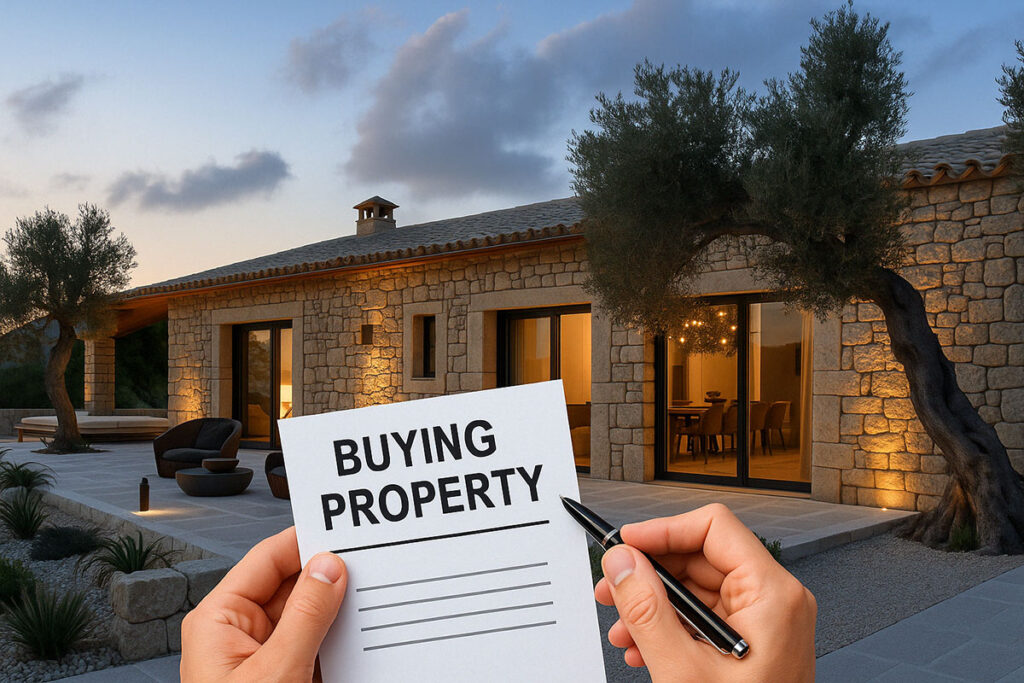The internet is flooded with guest posts discussing the general process of buying property overseas. In this article, we will direct our focus on the key points that are unique to buying property in Mallorca.
Understand Mallorca’s Property Laws:
When considering property for sale in Mallorca, it’s crucial to understand the specific regulations that govern property ownership. Foreign buyers must obtain a Número de Identificación de Extranjero (NIE), which is required for tax payments and property transactions. It’s essential to hire an experienced lawyer who knows Mallorcan property law and specializes in international clients, as some aspects of the transaction may differ for non-residents. Additionally, a notary is involved in verifying the seller’s legal right to sell and ensuring the transaction complies with Spanish law. Working with a knowledgeable lawyer and notary will streamline the process and protect your investment.
Choose the Right Real Estate Agent:
In Mallorca, real estate agents typically specialise in specific regions, so it’s rare to find one who can cover the entire island comprehensively. However, many agents collaborate with others to provide access to properties in areas outside their primary focus. It’s essential to choose an agent who not only knows your preferred region well – whether it’s Palma, Calvià, Andratx, or Pollensa – but also has the ability to work with other agents to ensure you have access to a broader range of properties. Be sure to select an independent agency with a solid reputation, as they will help you navigate the local market, arrange viewings, and provide reliable advice throughout the process
Spend Time on the Island:
Though online research provides valuable insights into Mallorca’s property market, nothing beats physically spending time on the island. Mallorca’s diverse regions – from the luxurious waterfront areas of Puerto de Andratx and Santa Ponsa to the charming villages in the interior – offer varying lifestyles and property types. Some areas are seasonal, with tourist hotspots seeing more demand during the holiday months, while other locations experience consistent demand year-round. Exploring the island will help you determine which region best suits your preferences, whether you’re looking for a holiday home or an investment property.
Closing Costs:
It’s important to understand that closing costs for Mallorca can vary significantly depending on the property price. Typically, you should expect closing costs to range between 10% to 13% of the purchase price. For new builds, you’ll pay VAT (10%) and stamp duty (1.5% to 2%). For pre-owned properties, there’s a Transfer Tax (ITP), which ranges from 8% to 13% depending on the property’s value. Additional costs include notary and registry fees (around €1,000), legal fees (1% to 2%), and other administrative fees. Proper budgeting for these costs is essential to avoid surprises.
Foreign Exchange Risk:
For foreign buyers of property in Mallorca, managing foreign exchange risk is crucial, especially when purchasing off-plan. With off-plan purchases, the settlement period is often extended, and payments are typically made in instalments as the property is being built. This longer timeline exposes buyers to currency fluctuations, which can significantly affect the final cost of the property.
Foreign exchange risk applies when the price of the property is specified in one currency, but the buyer’s funds are held in a different currency. During the extended settlement period, fluctuations in exchange rates can cause the cost in the buyer’s home currency to increase or decrease, depending on the market.
Currency movements during the construction period can increase or decrease the amount you ultimately pay. As exchange rates fluctuate, the cost in your home currency may rise or fall, making it vital to plan ahead. Consider working with an experienced currency exchange provider to lock in favourable rates and manage the risk of currency fluctuations.
For more details on how exchange rate risk specifically applies to off-plan properties, and how to handle it effectively, check out our full article on managing exchange rate risk when buying off-plan property.
Appointing a Notary:
In Spain, a notary plays a vital role in property transactions. They are impartial public officials responsible for ensuring that the sale adheres to all legal requirements and safeguards the interests of both the buyer and the seller. Notaries verify that the transaction complies with Spanish law, providing legal assurance throughout the process.
Key Responsibilities of the Notary
- Witnessing the Deposit Agreement (Contrato de Arras): In Mallorca, it’s common for the deposit agreement to be signed in front of a notary, adding a layer of legal protection and neutrality to the agreement.
- Certifying the Final Purchase Contract: The notary prepares and certifies the official purchase contract (known as escritura pública), which is essential for the property’s official registration.
- Verifying the Seller’s Ownership: The notary checks that the seller has the legal right to sell the property and is its rightful owner.
- Ensuring Legal Compliance: The notary confirms that all necessary taxes, such as VAT or transfer tax, are calculated and paid as part of the transaction.
- Explaining the Contract: Notaries also explain the contract terms to ensure both parties understand their rights and responsibilities fully.
- Registering the Property: Once the sale is completed, the notary ensures that the property is officially registered in the buyer’s name at the land registry (Registro de la Propiedad), protecting the buyer’s ownership rights.
Notary Fees
In Spain, notary fees are regulated by law and vary depending on the property price. Generally, these fees range from €600 to €2,000, though the final amount may depend on the complexity of the transaction, the notary’s fee structure, and the property’s location. Buyers should budget for these fees as part of their closing costs.
Deposit Agreement – Contrato de Arras
Also known as the preliminary agreement, the Contrato de Arras formalizes the transaction and usually requires a 10% deposit from the buyer. While ideally signed after due diligence is complete, in Mallorca’s competitive market, it is often signed earlier. To protect the buyer, it’s important to ensure the contract includes a clause that guarantees the deposit is refundable if the sale falls through due to legal or structural issues.
Conducting Due Diligence
Due diligence is a crucial step to ensure the property is free from any legal, financial, or structural issues. Important aspects of due diligence include verifying the property title, checking for any liens or encumbrances, confirming that building permits are in place, and reviewing rural properties or new developments for additional concerns. It’s also advisable to check land use regulations for rural properties and investigate any future development plans nearby.
Applying for a Mortgage
Securing a mortgage in Spain requires early preparation. Non-residents can typically borrow between 60% and 70% of the property’s assessed value, while residents may borrow up to 80%. Mortgage applications can take longer for non-residents, so it’s wise to plan accordingly. Working with a mortgage broker can be beneficial as they can:
- Provide access to a broader range of mortgage products.
- Increase the likelihood of loan approval by matching your financial profile to lenders’ criteria.
- Streamline the process by dealing directly with lenders and underwriters.
In most cases, the mortgage broker’s commission is covered by the lender, although some brokers charge the buyer a fee, usually around 1% of the mortgage amount.
Get an NIE Number
To complete the property transaction, a Spanish NIE (Número de Identidad de Extranjero) is required. This number is needed to pay taxes and officially register the property in your name. Apply for it at least one month before signing the deed of sale.
Open a Spanish Bank Account
While not legally required, opening a Spanish bank account can simplify managing property-related finances, including paying taxes, utility bills, and mortgage payments. This is particularly useful for non-residents whose income comes from outside Spain.
Key Takeaways
While buying property in Mallorca involves many of the same steps as elsewhere, understanding the specific nuances of the island’s market is essential for a smooth transaction. From navigating the legal requirements to choosing the right location, following these key steps will ensure that your property purchase is a success.



